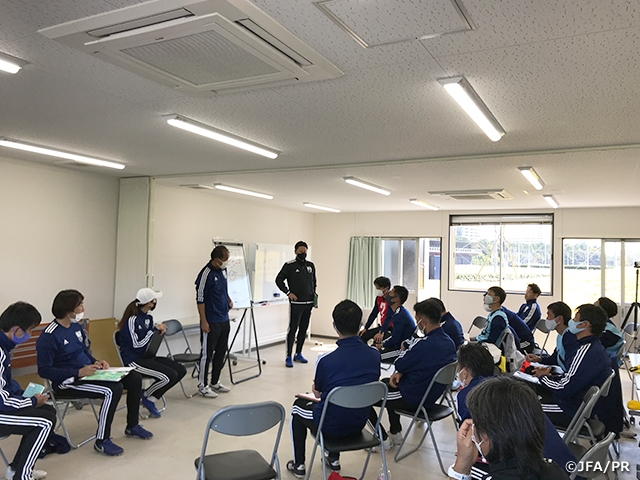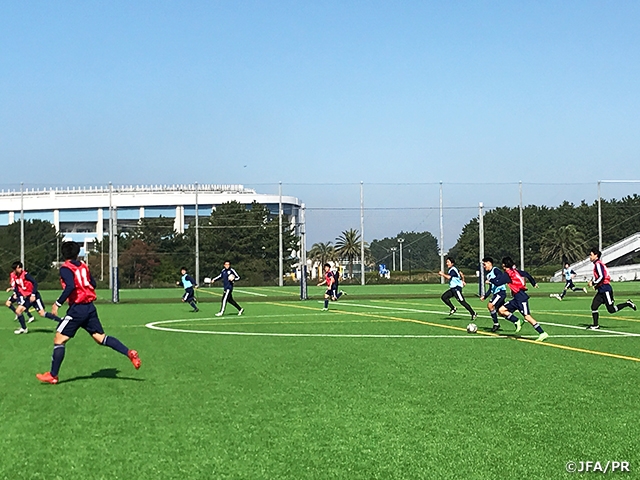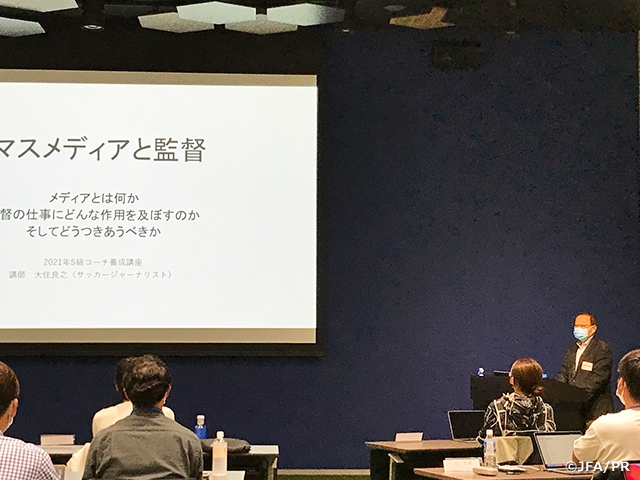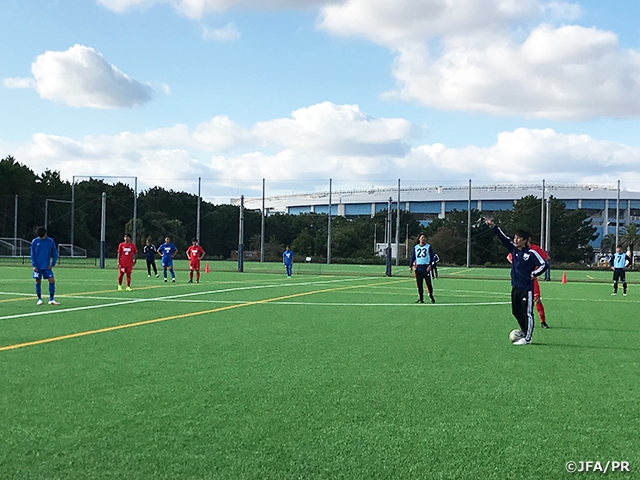NEWS
Class S Coach Training Course 2021 Module4/Intensive Course (8) Participant's Report Vol.11
05 November 2021

The second week of Module 4 has started under the crisp and clear autumn weather.
In order to compensate for the lack of time spent on practical coaching during Module 3, in which the intensive course was held online, practical coaching sessions are held once a week in the afternoon during Module 4.
In addition to physical fitness, the participants were required to make full use of their five senses through a succession of practical coaching, lecture, and discussion sessions.
Module 4 Intensive Course (8)
Date: Mon. 25 - Thu. 28 October
| Mon. 25 October | PM | ・Club operation/Club licensing regulations: Director SUZUKI Tokuaki (J.League Club Operation Department), Club Licensing Officer OHSHIRO Ryota (Club Licensing Department) ・Medical coordination: JFA Medical Committee member KATO Haruyasu |
|---|---|---|
| Tue. 26 October | AM | ・Practical coaching session |
| PM | ・Practical coaching session | |
| Wed. 27 October | AM | ・Practical coaching session |
| PM | ・Media theory: OSUMI Yoshiyuki (Journalist) | |
| Thu. 28 October | AM | ・Practical coaching session |
| PM | ・Cooperation with referees: JFA Referees Committee Vice Chairman/ Domestic Referees Development Group Senior Manager OGAWA Yoshimi, J.League Referees Development Group Senior Manager OGIYA Kenji |
Support players: Meikai University Football club, Edogawa University Football club

Participant's Comment
Coach NAKAMURA Motohiko (Kanagawa Football Association)
The second week of the Module 4 intensive course was held at Prince Takamado Memorial JFA YUME Field in Chiba, where the participants attended eight practical coaching sessions and four lectures.
In “Club Licensing,” Mr. Suzuki and Mr. Ohshiro of the J.League Club Operation Department explained about Club operation and club licensing regulations in the J.League. At the end of the session, the participants discussed and shared what kind of club management information they should pay attention to as a coach and how they should be involved in club management. I learned that a coach is not just a person in charge of the affairs on the pitch, but also a person who understands the club's philosophy and vision to work with the management team to contribute to the development of the club.
In the “Medical coordination” session, Dr. Kato, team doctor of the Japan National Team, gave a lecture on basic knowledge about injuries, the concept of injury prevention trainings, and the relationship between fatigue and injuries. Here we learned that cooperation among coaches, physical coaches, and medical staff is very important, that Japan still has a lot of room for improvement in this area, and that the coach must make the final decision.
In “Media theory,” Mr. Osumi, a football journalist, gave a lecture on mass media and coaching, where we learned that the relationship between professional coaches and the media should ideally be an alliance who promote football together, and that coaches needs to educate the reporters and the media. He also mentioned the importance of having the clubs understand the advantages and disadvantages of SNS, and the need to educate players on SNS, so that everyone is aware of who is on the other side of the media.

In “Coordination of Technology and Referees,” we heard from Mr. Ogawa and Mr. Ogiya of the JFA Referees Committee. Mr. Ogawa began his lecture by saying that “the environment for referees is not sufficient in Japan,” and that “football understanding,” and “empathy” are important for referees. I felt the need for the coach to have a firm understanding of the Laws of the Game and to work with the referees to make football more exciting. Mr. Ogiya shared a video about “significantly fraudulent plays,” and through discussions, we came to the conclusion that we need strict officiating to protect the players.
Starting from Tuesday morning, the participants held practical coaching sessions based on seven themes. 16 participants were divided into four groups and held group meetings during our free time to discuss the training menu from various angles and decide the menu, before holding the one hour training session.
We gave feedbacks on the menu, in which each group planned with various assumptions and objectives, from the players’ perspective and from the perspective of those observing the session. Through these coaching sessions, we were able to find out the pros and cons of our approach and expand our capacity as a coach, which was truly a valuable experience.
With this long coaching course nearing the end, we are left with limited time to learn in such a wonderful environment. I would like to express my gratitude to the instructors, staff, players from Meikai University and Edogawa University who have been participating as support players, assistant students, lecturers, and fellow participants. I would like to cherish each day to obtain more new findings.

Next time we will share the report of coach HAJI Toshiaki of the Tokushima Football Association.
Related News
-
Coaches
2021/10/29
Class S Coach Training Course 2021 Module4/Intensive Course (7) Participant's Report Vol.10

-
Coaches
2021/09/24
Class S Coach Training Course 2021 Module3/Intensive Course (6) Participant's Report Vol.9

-
Coaches
2021/09/17
Class S Coach Training Course 2021 Module3/Intensive Course (5) Participant's Report Vol.8

-
Coaches
2021/09/09
Class S Coach Training Course 2021 Module 3/Short-course (3) Participant's Report Vol. 7

-
Coaches
2021/06/25
Class S Coach Training Course 2021 Module2/Intensive Online Course (4) Participant's Report Vol.6

Latest News
-
National Teams
2025/06/28
【Match Report】Nadeshiko Japan Fall 1–3 to Spain

-
National Teams
2025/06/24
U-16 Japan National Team squad & schedule - China PR Tour: CFA PEACE CUP (7/1-9@Shenyang, China PR)

-
National Teams
2025/06/19
U-17 Japan Women's National Team squad & schedule - USA Tour (6/21-7/3@Kansas City, USA)

-
National Teams
2025/06/17
Nadeshiko Japan (Japan Women's National Team) squad & schedule - EAFF E-1 Football Championship 2025 Final Korea Republic (7/6-17@Korea Republic)

-
National Teams
2025/06/17
Nadeshiko Japan (Japan Women's National Team) squad & schedule - International Friendly Match vs Spain Women's National Team (6/27@Madrid, Spain)



